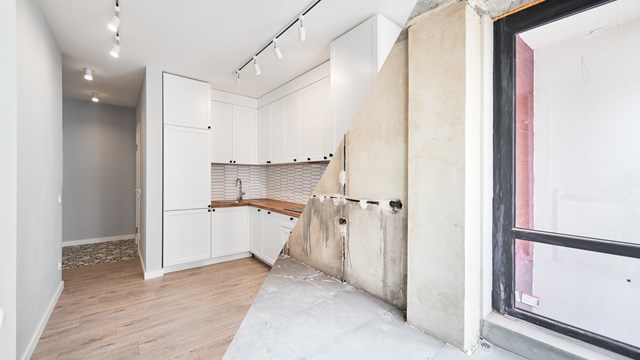There are plenty of reasons why a co-op shareholder or condo owner might want to make changes to their unit. Maybe it’s a new owner who wants to do major renovations to make the unit a better fit; perhaps it’s a long-time resident who buys an adjacent unit and wants to knock down some walls to make one big apartment; or an owner could just be sick and tired of his flooring and wants to install something new.
In each of these scenarios, the first step should always be petitioning the board for permission to perform the proposed alterations, but often, residents forge ahead without securing that permission—either because they resent having to consult the board before doing work on their own home, or because they don't want to wait for the board to make a decision. While understandable, this side-stepping of proper protocol can lead to numerous problems.
“In dealing with renovation requests, the board is engaging in a balancing act between the clear benefits of renovation to the risk of the building,” says Bruce Cholst, a partner with the Manhattan-based law firm of Rosen Livingston & Cholst. LLP. “Those risks could include damage, disturbance and the prospect of legal liability.”
Howard L. Zimmerman, AIA, founder and principal of Howard L. Zimmerman Architects, P.C. in Manhattan, says every building should have a proper building alteration agreement in place.
In this document, “The board lays out what has to be filed; what the contractor qualifications are; what the hours of working are; and whether to file with the municipality or not,” says Zimmerman. “There should be house rules regarding the hours when work can be done, whether weekends are included...whether you can cut through walls and what protections are offered.”
Setting Rules
A key objective of any board, whether co-op or condo, is to protect the infrastructure of the property, which is why Zimmerman says things such as drilling through a wall and removing sound insulation can be a concern. “If you’re going to be using a significant amount of electricity, does that suck the power from other buildings in the complex? That’s also a concern,” he says. “Are you going to alter the look of the roof or the façade? That’s a concern.”
Cholst says that two things a board can do to set parameters for residents' projects is to first decide on and draft minimum standards required for any project, and second, make an alteration agreement that all residents must sign agreeing to all written terms. “It should be a living document,” says Cholst. “Every time the building has an experience that’s not covered specifically by the alteration policy, it should be incorporated and the policy updated.”
When it comes to the requirements boards should set for shareholderas/owners wishing to alter their apartments, Eric M. Zim, Esq., a managing partner with Horwitz & Zim Law Group, PC in Manhattan. notes there are two important issues:
“First, there are alterations, repairs or improvements that require approval beyond the board of directors. In such a case, generally the owner of the building—not the owner of the shares for the particular unit—has to apply for a Building Construction or Alteration Permit,” he says. “There are many documents to submit that vary based on the type of work and other criteria. Submission of a PW1: Plan/Work Approval Application form with affidavits of costs, insurance, and so forth.”
Second, not all work requires a permit, but still, bylaws can regulate the performance of any work affecting the building, even though the decision of outside authorities is not required. According to the pros, failure to comply with any of the cooperative or condominium’s governing documents shall be grounds for an action to recover sums due, for damages or injunctive relief.
A corporation can issue bylaws, amendments, policies, and even execute an alteration agreement with each shareholder. However, says Zim, “To make sure it’s legally enforceable, the board should make sure that buying the shares to have a right of possession of a unit, an individual either simultaneously acknowledges their awareness about the bylaws and all corporate documents, or enters into an alteration agreement. This includes house rules subsequently adopted by the board and not contained in the bylaws. Frankly speaking, it’s reasonable to do both.”
It needs to be emphasized that the board cannot create house rules that restrict the use of property if that restriction or power to restrict is not set forth in the bylaws.
The Board’s Business?
Let’s say a resident wants to change out their kitchen cabinets, or their bathroom tile, and aren’t sure if they need permission from the board before work commences. Zim says this is an acute issue with no easy answer. Sometimes there is no procedure for approval, but the guidelines of the board restrict particular cosmetic changes.
“On the one hand, cosmetic alterations that do not affect the exterior of the building and common areas are not deemed to be approved by the board. Nevertheless, the situation may change depending on the building,” he says. “If it has fragile walls because of the old age, it’s reasonable to regulate any alterations or improvements that affect walls in any way, including cosmetic alterations.”
For cosmetic alterations such as these, Zimmerman notes that before work is done, it must be determined whether or not it involves plumbing and electricity, and that should be the concern of the board.
“Cosmetic renovations, such as painting and refinishing of floors, needs to go before the board and then they will determine if it needs to be filed or reviewed,” he says. “The emphasis is not that the board is trying to be ‘Big Brother’ and get involved in your life; they are there to protect the integrity of the building, the structure and the infrastructure.”
Cholst notes that even for small things, the board needs to get involved at the very beginning and be aware of anything that’s being done. He cites a recent example of a Brooklyn condo owner who simply wanted to move a refrigerator from one side of the room to the other, and didn’t inform the board. The contractor involved mistakenly cut into a gas line and the building was without cooking gas for six months.
“It may not be a structural risk to the building but the board needs to know that it’s happening—and that the contractor is licensed and insured,” he says. “A board needs to be aware of any modification so if there is a problem, it can act.”
Time Matters
When contractors are coming into a building, besides a proper notification of the residents, arrangements in accordance with the rules must usually be made at least 48 hours in advance to reserve the service elevator or prep other common areas as needed—for example, laying down carpet or wall protection, etc.
Traditionally, work may only be scheduled Monday through Friday between the hours of 9 a.m. and 5 p.m., with no work allowed on weekends or holidays, except in cases of emergency or extreme necessity. “Time for tenant’s quiet enjoyment has to be respected,” Zimmerman says. “Sometimes, they allow quiet work—like painting, for example—to be done on Saturdays.”
In situations where project work requires shutting down water, gas, or electricity, or blocking the common areas, advance notification of building residents is also a very important part of the procedure.
A lot of alteration agreements also stipulate the exact deadline by which work and clean-up must be completed. These rules exist to prevent a 3-month project from extending to a 6-month project and causing daily hassles for both residents and building staff. “It reflects quality of life and compels people to have a sense of urgency to get their projects done,” Zimmerman says. “It’s important to set the standards for qualified contractors.”
Making a Decision
Specific rules for every type of alteration usually exist, be it plumbing, window replacement or electrical work. When reaching out for permission, Zim notes it is very important that boards describe the alteration standards thoroughly to its residents, including the amount of insurance, requirements for contractors, and so forth.
“There should be a pretty robust procedure of approval, because the board shall not unreasonably delay its decision,” Zim says. “For example, the term of reviewing the documents can be limited to 30 days after submission of all the documents and a processing fee.” Just as work-completion deadlines exist to compel contractors (and the residents who hire them) to stay on schedule, review deadlines encourage boards to go over the various pieces of documentation and render a yea or nay in a timely manner.
As for what the aforementioned documentation should include; in addition to the signed alteration agreement, all residents should include plans, drawings and a narrative description of the job so the board has all the facts in front of them for review. They should also have proof of insurance from their contractor(s).
“Board members sometimes can’t understand the technical plans, so the description goes a long way to helping board members review what needs to be done,” Choist. “Typically, a building has an architect on retainer to review these and evaluate them to see if it’s compliant with the alteration policy, and if there are any risks.”
When reviewing a resident’s alteration proposal for approval, Zim says a board has really broad discretion, especially when they have a negative expert review of the project. A board has the right to turn down a resident’s request for alterations or repairs on the ground of any legitimate interest of the corporation. Common reasons include violation of the alteration agreement, inconsistency with house rules or work not aesthetically consistent with the building or homeowner’s association.
While the board has an absolute right to say ‘no’ if it acts within a standard 60-day time frame, Cholst says a big “don’t” is in selective enforcement.
“You have to be uniform, and all requirements should be the same for all alterations. You can’t just refuse for no good reason,” he says. “A board doesn’t have a blanket check, they cannot unreasonably reject or delay a renovation. If you’ve approved one alteration, you can’t turn down a similar one.”
Choist says not to be too quick to say ‘no’ and if there is some sort of risk, the board and architect should work with the resident on a modification that would make the project feasible.
Each board has their own rules. Some buildings only allow two alterations at one time. Some boards only allow work during the summer, when more residents may be out of town, and therefore less inconvenienced by workers and equipment in the building. “Vertical construction can change the operations of the building. Construction can impact maintenance, garbage, housekeeping operations, deliveries, etc.,” Zimmerman says. “The review process is at least a couple of months in advance of actual construction. Boards need time to review and put it in the queue with other renovations that have been scheduled.”
From the board’s perspective, they have a building to run, while to residents, a renovation can be the most important thing in their lives. When all is considered in advance, it minimizes last minute panic and stress for everyone involved.
Keith Loria is a freelance writer and a frequent contributor to The Cooperator.







Leave a Comment